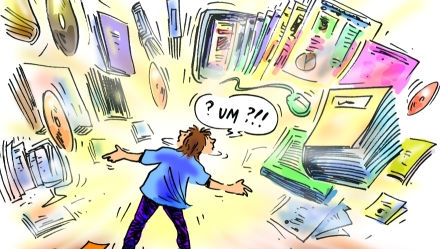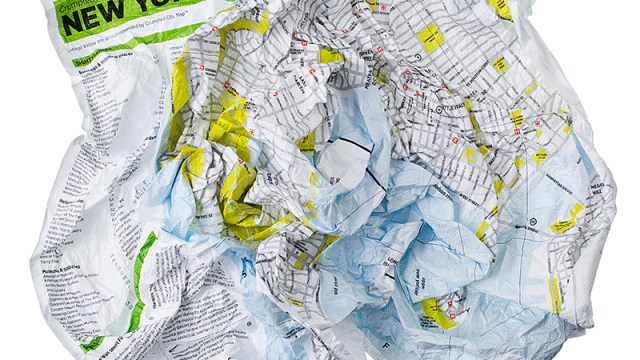Is Multitasking Everything It’s Cut Out To Be? The Brain Says, No

Question: How do you remain mindful when juggling two, three, four, however many things at once? Answer: You probably don’t. For a long time, cognitive scientists have observed that processing multiple streams of information at once seems problematic for the human brain. And yet, today, multitasking is not only seen as almost necessary (we’re expected to always be reachable, by phone, by email – but to get things done while being in this constantly reachable, and so by definition disruptable, state) but also overwhelmingly as a positive thing. I’m good at multitasking, you might say in an interview. Or maybe, I’m a great multitasker. But is that even possible? Are you good, or great, really? And what does being good at multitasking even mean?
How multitasking might hurt your ability to perform well
A number of recent studies point to a different reality: if you think you are good at doing many things at once, chances are, you aren’t doing any of them particularly well. In fact, individuals who are self-defined heavy media multitaskers—in other words, those of use who consume multiple streams of content or items at the same time—are likely to be more susceptible to irrelevant stimuli in the environment and irrelevant representations in memory (and more likely to get distracted as a result) and are actually worse than light media multitaskers at task-switching – the very thing you’d think multitaskers would be better at doing.
So what’s happening? The first thing is obvious: depth is being sacrificed for breadth. And that’s not necessarily a bad thing. Sometimes, it’s far better to know how to skim and extract relevant points quickly rather than become immersed in one particular item or topic. But the key word here is sometimes. We need to know when to skim and when to go deep. A chronic tendency to do the former at the expense of the latter may, as these findings show, actually alter our brain’s underlying information processing and its cognitive control mechanisms, so that we become unable to weed out the irrelevant inputs that come both from the outside (media streams, etc.) and the inside (our own memories), and as a result, can’t focus our attention when multiple distractions are present. So, because we can’t suppress the irrelevant information quickly and efficiently, we become worse at the very thing we’re supposed to be good at: switching between tasks.
It’s all downhill from here…
And, the problem is likely to get worse with age. An imaging study in last month’s PNAS illustrated that older adults did worse on tests of working memory when interrupted than did younger adults. While both groups were able to disengage from the memory maintenance network in order to attend to new stimuli, older adults failed to reconnect with the network after the disruption. In other words, if you’re working on something and something else comes along, you might not be in the best position to pick up where you left off. With that brief interruption, your brain might actually be shedding important information as you turn your attention elsewhere. I’d like to note that multitasking has already been shown to negatively impact working memory, for everyone, regardless of age, so this is not to say that you only have to worry as you age – only that you have to worry more, and that the problem seems to be one of information processing in the brain and so potentially more deeply-rooted than previously thought.
But of course, I’m an exception: I’m a great multitasker
Of course, most people don’t think any of this applies to them. I think better this way. I concentrate better. I am good at multitasking, and this has made me better at so many other things. Well, while we might think that’s true, according to our brains, it isn’t. Now, I am sure there are exceptions. There are always exceptions. Maybe, you happen to be the exception. But don’t count on it. It’s the law of averages: almost everyone thinks they are above average in everything, but that is not just a statistical impossibility. As much as you want these findings to not apply to you, chances are, they do.
Even Stephen King, who wrote extensively in On Writing: A Memoir of the Craft of his habit of writing while listening to heavy metal—a kind of multitasking, even media multitasking, in its own right—took it back in his interview with the Paris Review, saying, when asked about the habit of listening to loud music while working, “Not anymore. When I sit down to write, my job is to move the story…. I don’t want to dawdle around and look at the scenery. To achieve that pace I used to listen to music. But I was younger then, and frankly my brains used to work better than they do now. Now I’ll only listen to music at the end of a day’s work, when I roll back to the beginning of what I did that day and go over it on the screen … [and] I’m not really listening to the music—it’s just something there in the background.”
And that last point is exactly the point: both tasks (for King, listening and writing) cannot possibly be in the foreground. One has to have the focus, and the other, be nothing more than irrelevant noise, something to be filtered out. Something has to give. And if it doesn’t, chances are nothing will be at the same level as it would have been had you just worked on it exclusively. Yes, you’ll get it all done, and perhaps even done well by most standards. But not by your standards. I’m willing to bet that the product, for you, would have been better if you had just devoted your attention, your time, your mind to it and it alone.
So what to do? Balancing multitasking and single-focus
Of course, we have to face reality. Multitasking is likely here to stay, and working on one thing at one time is increasingly a rare luxury. And as I mentioned earlier, for some things, multitasking may be just fine – better than fine, even, the right approach. But for others, more care is needed, and that same level of care cannot be attained in a multitasking environment. So, multitask away, but also recognize that if something really matters, requires attention, memory, effort, multitasking will only hurt it.
I know a psychology professor who turns off her email and internet access for two hours every day, to focus exclusively on her writing. I think there’s much to learn from that self-enforced discipline and distance. It’s certainly an approach I wish I took more often than I do. Consider the results of a recent nature intervention by a neuroscientist who wanted to demonstrate what could happen if people took three days to be completely wireless in the wild: creativity, clarity in though, a reboot of sorts of the brain. We can’t all afford a three-day wilderness excursion, but maybe, just maybe we can afford a few hours here and there, where we can make a conscious choice: focus.





